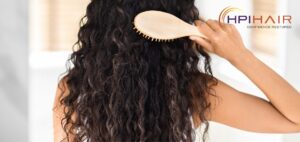Regrow confidence and beauty with the right biotin dosage for women.
Thinning hair can be a distressing experience, particularly for women. It not only affects one’s physical appearance but can also impact self-confidence and emotional well-being. As a result, many women turn to biotin supplements as a potential solution for hair loss. But how much biotin should women take to effectively combat thinning hair? In this comprehensive guide, we’ll delve into the role of biotin in promoting hair growth, explore the recommended dosage for addressing hair loss in women, and provide insights to help you make informed decisions about biotin supplementation for healthy, luscious hair.
Biotin and Hair Health
Biotin, also known as vitamin B7 or vitamin H, is a water-soluble vitamin that plays a crucial role in maintaining the health of our hair, skin, and nails. It is a key component in the production of keratin, a protein that forms the structural foundation of our hair strands. Adequate levels of biotin are essential for healthy hair growth, and a deficiency in this vital nutrient can lead to hair thinning and loss.
Research has shown that biotin supplements can help enhance the strength and thickness of hair, potentially reducing instances of shedding and breakage. However, it’s important to note that biotin alone may not be a cure-all for hair loss, especially if the underlying causes are related to medical conditions or hormonal imbalances. Nevertheless, incorporating biotin into your hair care regimen can be a beneficial step in promoting overall hair health.
Recommended Biotin Dosage for Thinning Hair in Women
Determining the right dosage of biotin for hair loss requires careful consideration and consultation with a healthcare professional. While the daily recommended intake of biotin for adults is 30 mcg, individuals seeking to address thinning hair or hair loss may benefit from higher doses.
For women experiencing hair thinning or looking to improve hair quality, the suggested biotin dosage typically ranges from 2,500 mcg to 5,000 mcg per day. It’s important to start at the lower end of this range and gradually increase the dosage if necessary, as excessively high levels of biotin supplementation could lead to potential side effects or mask underlying medical conditions. Consulting a healthcare provider before initiating biotin supplementation is crucial to ensure safety and efficacy.
In cases where hair loss is associated with specific medical conditions or hormonal imbalances, a healthcare professional may recommend tailored treatment plans that may involve a combination of biotin, other supplements, and prescribed medications. It’s essential to address the root causes of hair loss comprehensively.
Factors Influencing Biotin Absorption and Efficacy
While determining the appropriate biotin dosage is vital, it’s equally important to consider factors that can influence biotin absorption and efficacy in promoting hair health. Several factors can impact the body’s ability to absorb and utilize biotin, including:
1. Genetic Predisposition: Some individuals may have genetic variations that affect their ability to metabolize biotin effectively. Understanding one’s genetic predisposition can help tailor supplementation strategies for optimal results.
2. Dietary Habits: A well-balanced diet rich in biotin-containing foods, such as eggs, nuts, seeds, and leafy greens, can contribute to overall hair health and support the efficacy of biotin supplementation.
3. Underlying Health Conditions: Certain health conditions, such as gastrointestinal disorders or metabolic disturbances, may affect the body’s ability to absorb and utilize biotin, warranting additional considerations in supplementation.
ddressing these factors, individuals can optimize the absorption and utilization of biotin, potentially enhancing its effectiveness in promoting hair growth and thickness.
The main takeaway
Biotin supplements can play a valuable role in promoting hair health and addressing thinning hair in women. Understanding the recommended dosage, considering individual factors that influence absorption, and consulting with healthcare professionals are pivotal steps in harnessing the potential benefits of biotin for combating hair loss. While biotin can be a beneficial complement to hair care regimens, it’s essential to approach hair loss holistically and address any underlying medical conditions that may contribute to the issue. By taking a comprehensive approach to hair health, women can empower themselves to nurture and maintain luscious, vibrant hair.









